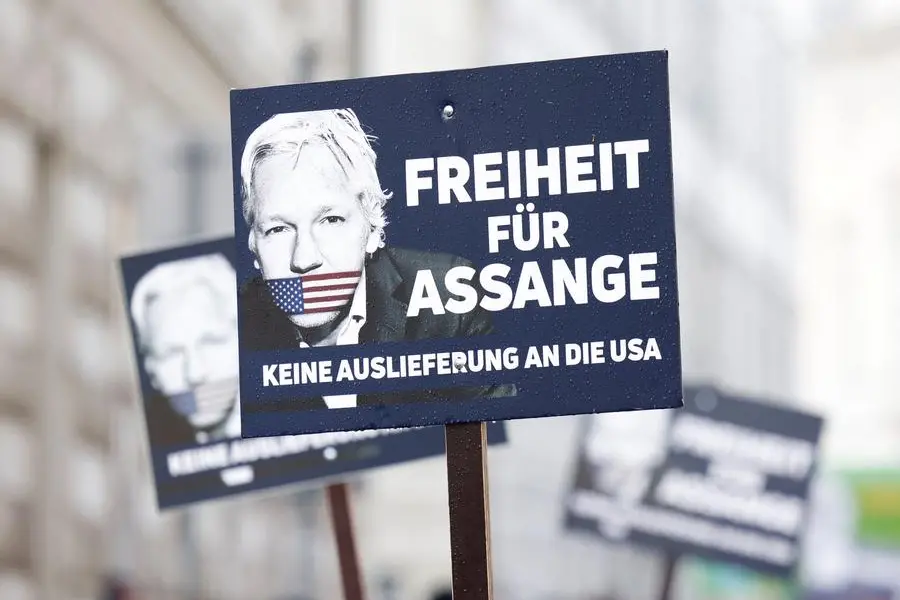PHOTO
Lawyers for the United States on Wednesday urged a UK court to block a last-ditch bid by Julian Assange to appeal his extradition there to face espionage charges.
Washington indicted the WikiLeaks founder multiple times between 2018 and 2020 over its publication of hundreds of thousands of secret military and diplomatic files on the US-led wars in Iraq and Afghanistan.
The long-running legal saga in Britain's courts is now nearing a conclusion, Assange having lost successive rulings in recent years.
On the first of two days of evidence before two High Court judges, the Australian's lawyers argued Tuesday those previous decisions contained "errors of law".
The US charges against him were "political", they insisted: he was being prosecuted "for engaging in ordinary journalistic practice of obtaining and publishing classified information".
Assange's lawyers also argued that the decades-long prison sentence he faces is "disproportionate". Washington is acting in "bad faith" and contravening the extradition treaty between the two countries, they said.
- Assange's actions 'unprecedented' -
But on Wednesday, Clair Dobbin, for the US government, told the court that the prosecution was "based on the rule of law and evidence".
Assange actions were "unprecedented", she argued.
He "indiscriminately and knowingly published to the world the names of individuals who acted as sources of information to the United States," she said. This was what set him apart from other media organisations.
"It's these facts that distinguishes him -- not his political opinions."
In written submissions, the US legal team argued that the UK courts had already made "an emphatic rejection of the... attempts to characterise the allegations he faces in the United States as merely routine journalism or merely assisting a whistleblower".
Assange was absent from the court for two-day session, and did not follow proceedings via video, due to illness, his lawyer told the judges Tuesday.
- 'World watching' -
These hearings could be his last chance to fight extradition in Britain's courts after a years-long battle.
The judges will not deliver their ruling immediately after the hearings, but at a later date which is yet to be announced.
They will decide whether to grant him another full appeal hearing. But if they rule against him, he will have exhausted his UK legal options.
However, his wife Stella Assange has said he would then ask the European Court of Human Rights to temporarily halt the extradition, arguing that he would die if extradited.
"We have two big days ahead," she told supporters outside court Tuesday.
"We don't know what to expect, but you're here because the world is watching.
"They just cannot get away with this. Julian needs his freedom and we all need the truth."
The couple, who met when Stella worked on his legal case in the mid-2010s, have two children together.
US President Joe Biden has faced domestic and international pressure to drop the 18-count indictment against Assange in a Virginia federal court filed under his predecessor Donald Trump.
Major media organisations, press freedom advocates and the Australian parliament have all denounced the prosecution under the 1917 Espionage Act, which has never been used over the publishing of classified information.
Washington alleges Assange and others at WikiLeaks recruited and agreed with hackers to conduct "one of the largest compromises of classified information" in US history.
Assange was finally arrested in 2019 after spending seven years holed up in Ecuador's London embassy.
He had fled there to avoid extradition to Sweden, where he faced accusations of sexual assault that were later dropped.
A UK district judge previously blocked his extradition, but the High Court reversed the decision on appeal in 2021 after Washington vowed not to imprison him in its most extreme prison, "ADX Florence".
It also pledged not to subject him to the harsh regime known as "Special Administrative Measures" and eventually allow him to be transferred to Australia.
In March 2022, the UK's Supreme Court refused permission to appeal there, arguing Assange had failed to "raise an arguable point of law".
Months later, the then interior minister Priti Patel formally signed off on his extradition.





















